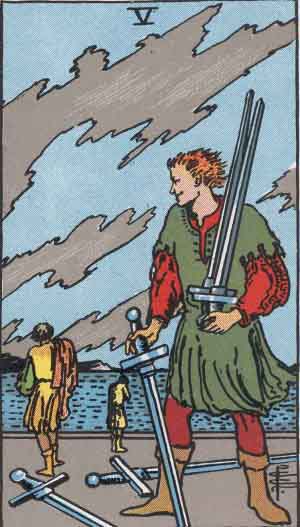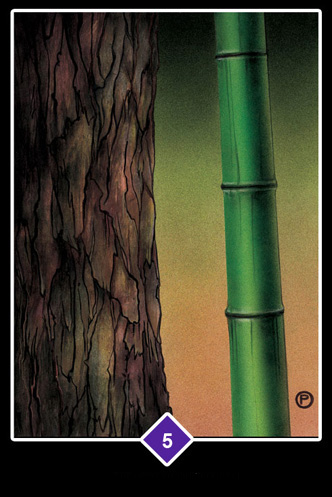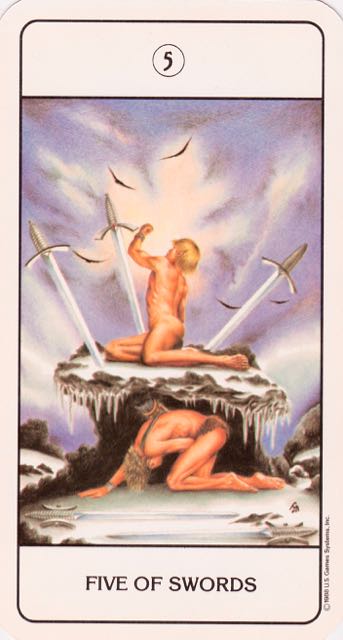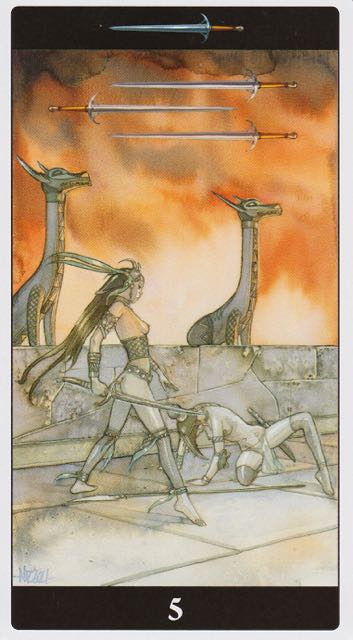
Five of Swords
A disdainful man looks after two retreating and dejected figures. Their swords lie upon the ground. He carries two others on his left shoulder, and a third sword is in his right hand, point to earth. He is the master in possession of the field. Divinatory Meanings: Degradation, destruction, revocation, infamy, dishonour, loss, with the variants and analogues of these. Reversed: The same; burial and obsequies.
A. E. Waite, Pictorial Key to the Tarot (1911)
A change of ideas or plans becomes unavoidable. Being forced by circumstances to see things from a different angle. Cause here we have defeat, loss, torments, corruption, treachery and a lack of understanding. It is better to accept these limitations and face one's own inner laws, own beliefs and also the capabilities to deal with poverty and anxiety. The mind has reached the impasse and tries to come out of it by brainstorm.

5 of Clouds: Comparison
Who ever told you that the bamboo is more beautiful than the oak, or the oak more valuable than the bamboo? Do you think the oak wishes it had a hollow trunk like this bamboo? Does the bamboo feel jealous of the oak because it is bigger and its leaves change color in the fall? The very idea of the two trees comparing themselves to each other seems ridiculous, but we humans seem to find this habit very hard to break.
Let's face it, there is always going to be somebody who is more beautiful, more talented, stronger, more intelligent, or apparently happier than you are. And conversely, there will always be those who are less than you in all these ways. The way to find out who you are is not by comparing yourself with others, but by looking to see whether you are fulfilling your own potential in the best way you know how.

Tarot of the Ages - Mario Garizio ©1988 U.S. Games Systems, Inc.
Upon emerging from the rest of the Four we find ourselves back in the thick of conflict on the Five of Swords. The image on the Rider-Waite and its many variants is that of a victorious man and two defeated opponents, and in this symbolism we see more of the typical duality of the Swords suit. When this card appears it usually means that you are defeated - cheated out of victory by a vily and cunning opponent. But sometimes you are that victor, the one who has defeated your opponents through the use of your mind. Whether the victory was an ethical one remains to be seen.
But let us return to the theme of defeat, which is the primary meaning of the Five of Swords. This is perhaps why the card is so unwelcome in readings; it shows that, despite your best efforts, you are likely to be beaten. But the Five of Swords is not only about being defeated and disappointed because of that defeat. If you allow yourself to become disillusioned after such a loss then you are on the path to greater ruin. Take defeat, learn from it, and then try again to succeed. It has been said that a good man will be beaten, and accept losing - but a great man will be beaten, then go back and win.
When the Five of Swords appears and you feel that you are on the winning side this time, there is still a warning to heed. Arrogance and pride often come hand in hand with a difficult victory such as this, and you must be careful not to think you are invincible. You have overcome a challenge, and you have the right to feel proud, but know that there will be other foes to face and that some of them will eventually defeat you. Declaring your invincibility is an invitation for someone to prove you wrong. If your victory was won through cheating or unethical conduct, beware of an attempt at vengeance.
An interesting facet of this card is revealed by symbolism in the Rider-Waite scene. It shows a man with two swords lying at his feet - the spoils of his victory. But he already had three swords, and his trophies really represent nothing more than a hollow victory. It is plausible that the two "defeated" men were really not defeated at all; they simply laid down their arms and walked away. They either knew they would lose, or they knew winning would be a pointless exercise. And by choosing not to fight, they are really the winners here, because he who knows when to fight, and when not to fight, will be victorious.

Tarot of the Dream Enchantress ©2009 Lo Scarabeo